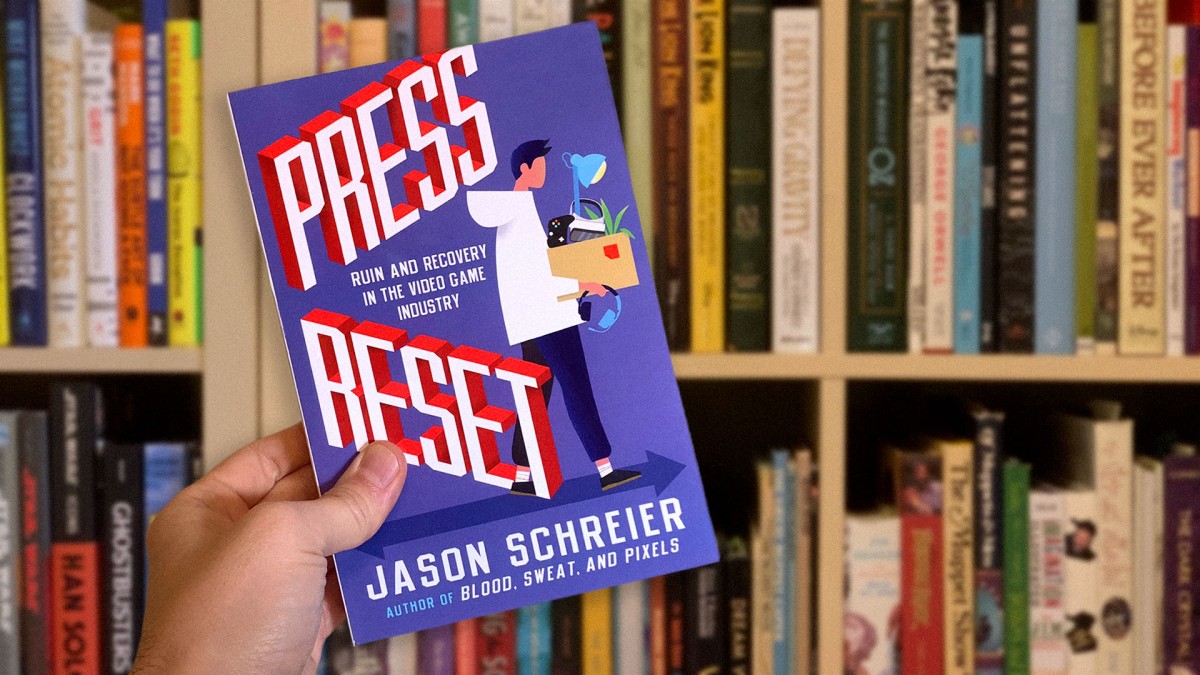Despite daily reminders that the video games industry is problematic as heck, many artists and developers still hope it will change for the better.
Games journalist and author of Press Reset: Ruin & Recovery In The Video Games Industry Jason Schreier meets with The Magic Box team to talk about how unionization and the normalization of remote work could help to calm things down…
Stabilizing A Volatile Industry:
[Chris] Press Reset: Ruin & Recovery In The Video Games Industry is a book about the consequences of crunch culture, but it’s also practical.
…and it even has notes of optimism.
[Jason] I describe it as a book about volatility.
…about what happens to [games industry employees after a studio shuts down] and they have to face the uncertainty of being unemployed in a hostile industry.
I put “recovery” in the subtitle because I didn’t want it to just be about awful things. I also wanted it to be about human resilience and how people bounce back and recover.
…and how the industry could potentially change.
For example, I explore systemic solutions such as unionization and remote work.
Normalizing Remote Work:
[Chris] Square Enix announced that they’re making remote work a permanent part of their work culture. Do you think remote work will become a “new normal” industry-wide?
[Jason] Right now, we don’t know exactly what’s going to happen.
Certainly, a lot of people want remote work and more flexibility even if it’s a hybrid model.
…but a hybrid model certainly wouldn’t solve all of the problems I’m talking about.
If you are caught up in a studio shutdown, one of the biggest potential challenges is having to move across the country – or the world – for your next job.
Remote work is a solution for that: You can still get a job anywhere without having to uproot your [personal life].
We’ll see if more companies are willing to go remote.
[Chris] In your book, you pitch another potential solution, these “pods” of specialists. Small studios or collectives that specialize in one particular aspect of the pipeline…
[Jason] The idea is: Instead of having an office with three-hundred people all working on one game and laying a bunch of them off when the game is finished, maybe there’s a creative core [team] of people that supervises and coordinates specialty offices across the world.
For a first-person shooter, one [specialty office] would specialize in weapon design, another in level design…
[Chris]…concept art, procedural effects…
[Jason] Yeah. I don’t know how practical that is. I’ve certainly seen some studios try different forms of it. A lot of studios outsource art.
It has its pros and cons, I would say…
The consensus seems to be that the [specialty office idea] is easier for the backend, technical aspects of game development.
With player-facing stuff, like the way the controls feel and how your character moves, it can be helpful to be in an office, where you can just grab the controller and pass it around.
Protecting Workers’ Rights:
[Chris] Press Reset is a collection of cautionary tales. Is there a meta lesson?
[Jason] You could look at it from a workers’ rights perspective and say that it’s fundamentally a problem of management having too much power and workers not having enough.
The fundamental thing that hasn’t happened yet (and feels inevitable) is organization across the video games industry.
You look at Hollywood, and a lot of people are able to keep sustainable careers, in part, because of union protections.
They have contracts in place. The worker has a seat at the table and can fight for certain things: standardized pay and titles, [overtime] pay…
Whereas, in games (at least in North America) there are no unions so there are no mechanisms in place for workers to be able to collectively get together and fight for their rights.
I think that, fundamentally, that’s the big change that needs to happen.
In Press Reset I wrote about how Curt Schilling’s 38 Studios imploded in 2012.
People were abruptly laid off. They didn’t get their final paycheck. They were robbed. No severance, nothing.
I think, though it wouldn’t have prevented the company from running out of money due to mismanagement and bad decisions, if they were unionized, they could have had a contract that said anytime there are layoffs, the studio has to provide severance.
So, instead of suddenly imploding, maybe the company could have shut down two months before and given severance to everybody.
People wouldn’t have been stranded and stuck with all these bills they couldn’t pay.
Unionization isn’t the solution for every single problem here, but it will allow workers to have more rights and to be able to fight for a seat at the table in a way that nothing else really can.
[Chris] You’re right that a union is not the one and only solution, but it’s huge.
We’ll never fix the industry without connection and communication.
It will require a collective effort.
Special thanks: To our guest Jason Schreier, the team at Grand Central Publishing for providing a review copy of Press Reset and for scheduling assistance, our Production Coordinator Mari Gonzalez Curia and Content Producer Mona Lloyd for editorial contributions to this post. The interview was lightly edited for grammar, clarity and time.
Get Our Free Artists’ Mindset Course:
Subscribe via email to get each lesson in our new artists’ mindset course, industry interviews and notifications about mentorship opportunities. It’s 100% free and we will always respect your privacy.
